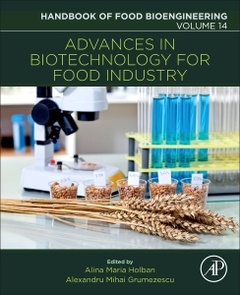Advances in Biotechnology for Food Industry Handbook of Food Bioengineering Series
Coordonnateurs : Grumezescu Alexandru Mihai, Holban Alina Maria

Advances in Biotechnology for Food Industry, Volume Fourteen in the Handbook of Food Bioengineering series, provides recent insight into how biotechnology impacts the global food industry and describes how food needs are diverse, requiring the development of innovative biotechnological processes to ensure efficient food production worldwide. Many approaches were developed over the last 10 years to allow faster, easier production of widely used foods, food components and therapeutic food ingredients. This volume shows how biotechnological processes increase production and quality of food products, including the development of anti-biofilm materials to decrease microbial colonization in bioreactors and food processing facilities.
1. Role of Biotechnology in the Agro-Food Industry 2. Biotechnology in Food Processing and Preservation: An Overview 3. Enzymes and food industry: a consolidated marriage 4. Lactic Acid Bacteria – From Nature through Food to Health 5. Development of controlled co-cultivations for reproducible results in fermentation processes in food biotechnology 6. Progress of biotechnology in food industry 7. Improvement of ripened cheese quality and safety with Thymus mastichina L. bioactive extracts 8. Potential of high hydrostatic pressure to improve the production of plants used as food 9. Corrosion in electronic sensors used in the manufacturing processes decrease the quality in the seafood industry located in the coast of Baja California, Mexico 10. Biotechnology of Ice Wine Production 11. Metagenomics of Traditional Beverages 12. Process Engineering Applying Supercritical Technology For Obtaining Functional And Therapeutic Products 13. Sugar beet pulp as a source of valuable biotechnological products 14. Biofilm mitigation in food industry: mitigation using bacteriophages 15. Bioactive properties and biotechnological production of human milk oligosaccharides
academic and industrial professionals and researchers in Food Science, Food bioengineering, Food safety and pharmaceutical science. Food Industry personnel. Bachelor/master and advanced level students, undergraduate/graduate students in food science, animal science, food production, biology, agriculture, Vet medicine, public health.
Alina-Maria Holban is a lecturer in Microbiology and Immunology, at the Faculty of Biology, University of Bucharest; and associate researcher at the University Politehnica of Bucharest, Romania. Her primary area of research is the development of bionanomaterials with antimicrobial applications. Dr. Holban has published 75 papers in peer-reviewed journals, 42 conference/symposia proceedings, and has edited more than 21 edited books.
- Presents basic to advanced technological applications in food biotechnology
- Includes various scientific techniques used to produce specific desired traits in plants, animals and microorganisms
- Provides scientific advances in food processing and their impact on the environment, human health and food safety
- Discusses the development of controlled co-cultivations for reproducible results in fermentation processes in food biotechnology
Date de parution : 01-2018
Ouvrage de 508 p.
19x23.3 cm
Thème d’Advances in Biotechnology for Food Industry :
Mots-clés :
Thymus mastichina L; acidic hydrolysis; agrofood industry; aguamiel; amylase; antiadhesins; antibiofilm activity; antimicrobial properties; ARDRA; aromatic plants; bacteriophage; bifidobacterium; bioactive compounds; biocontrol; biodiversity; biofilm; biogenic compounds; biomass pretreatment; biorefineries; biotechnology; cheese; chemicals from biomass; coculture processes; controlled coculture fermentation; CRISPR; cryoconcentration; detection techniques; development of new products; DGGE; electronic sensors; ELISA; enteropathogens; enumeration; environmental friendly technology; enzymatic tenderization; fermentation; fermented beverages; FISH; flavor formation; flow cytometry; food biotechnology; food industry; food safety; genetic techniques; genetically modified microorganism; health benefits; HHP; high hydrostatic pressure; high sugar fermentation; human milk oligosaccharides; ice wine; identification; immunomodulation; improving plant production; infant formula; infant health; lactase; lactic acid bacteria; lactobacillus; MALDI-TOF; manufacturing processes; microbial interactions; microorganisms; natural additives/ingredients; NGS; omics; osmophilic yeasts; PCR; plant; pozol; prebiotics; probiotic; probiotics; protease; pulque; reproducible food production; saccharification; seafood industry; seed; sugar beet pulp; sugar factories as biorefineries; supercritical carbon dioxide; technology developed; transgenic animal; transgenic plant; uncultivable microorganisms



